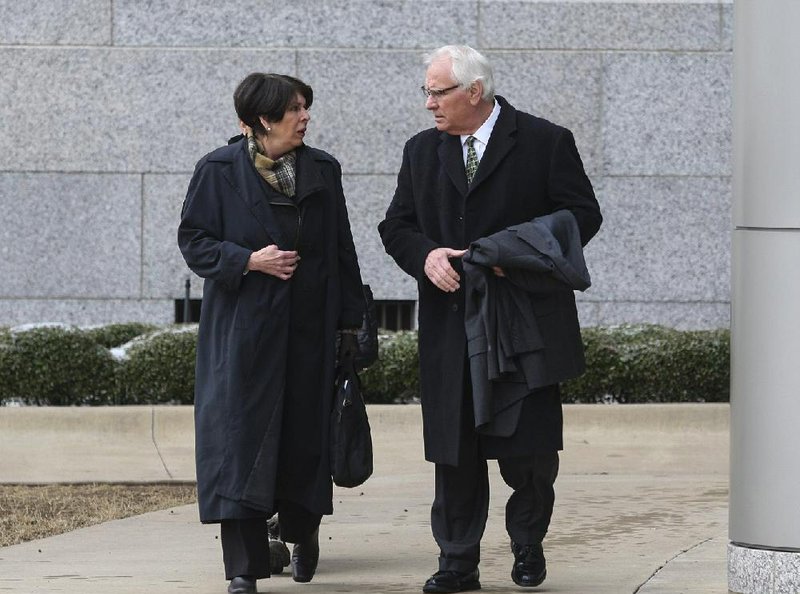Former state Treasurer Martha Shoffner has been held out as a participant in a “world-class scheme and high conspiracy” when in fact she was victimized by more sophisticated co-workers who didn’t like her and who “inflamed” investigators, her attorney told jurors Wednesday in the opening statements of her federal extortion and bribery trial.
“By the time you hear all the proof, I think you’ll ask yourself, ‘Are we collectively going mad?’” defense attorney Charles “Chuck” Banks told the seven women and five men seated as jurors in the case Wednesday afternoon.
Just before his remarks, jurors heard from Assistant U.S. Attorney Jana Harris, who said jurors would come to see how Shoffner, 69, used her influence as an elected official to benefit a bond broker, Steele Stephens, in return for him giving her $6,000 every six months to rent a Little Rock apartment and avoid a daily commute from her hometown of Newport.
Harris noted that Stephens’ father was also from Newport.
Until Wednesday, prosecutors hadn’t publicly identified Steele Stephens as their main witness in the case against Shoffner. Court documents have referred to him only as “Confidential Source No. 1.”
Harris said an annual audit of the treasurer’s office, conducted in the summer of 2011 by the state Legislative Audit Division, raised “red flags” by revealing that Stephens had been receiving “considerably more money from the state to invest than [had] any other broker.”
The state makes money off interest generated by the bonds, Harris said. She said the state conducted business with 10-15 licensed security brokers, with each’s share of the state’s business documented in a bond portfolio.
In June of 2011, about three months before the state invested more than $100 million through Stephens, Shoffner gave him a copy of the bond portfolio, which other brokers had previously requested but none had ever received, Harris said. She said the investment in September of 2011 gave him almost $400 million of the state’s bond business, “more than any other broker ever had.”
During that time, the prosecutor said, Shoffner was often heard complaining that as an elected official, she didn’t make as much money as some other employees in her office, who were career accountants and were paid roughly $80,000 compared with her salary of just over $50,000. Shoffner isn’t an accountant, and the state doesn’t require its treasurer to be an accountant.
Harris said Stephens will testify that in the spring of 2010, when Shoffner was losing access to a Little Rock apartment in which she had been staying rent-free, she asked Stephens to buy her a home in Little Rock. Harris said both agreed that it would “look bad” if anyone found out that the state treasurer was living in a home owned by a broker, so they decided that Stephens would instead give Shoffner $1,000 cash each month. Because it might look suspicious for them to meet every month, they decided to meet every six months, at which time Stephens would give Shoffner $6,000 cash, Harris said.
The prosecutor said the money was handed over twice at the Capitol, where Shoffner’s office was, twice at her home in Newport and twice at her apartment in Little Rock. The cash delivered to Shoffner’s home in Newport was on both occasions rolled up and placed inside a pie box alongside a pie, she said.
Meanwhile, at legislative hearings in the fall and winter of 2012, Shoffner denied that she had received anything of value from Stephens, Harris said.
“They’ve used the pie box as a sort of gimmick to insinuate there’s something stinky going on,” Banks told jurors. He said investigators encouraged by Shoffner’s employees “tried to make a big production out of what I call a lost opportunity,” after an investment of state bonds netted Stephens a huge profit while the state’s profit fell short of expectations.
Banks emphasized that while the state didn’t make as much money as hoped, it “didn’t lose money,” and “the public was well-served.”
He added that “the state was making millions of dollars from Mr. Stephens’ trades.”
He said Shoffner’s reluctance to talk about Stephens’ gifts of cash to her was merely an attempt to avoid an infraction before the state Ethics Commission for failing to report cash donations that the broker made to her campaign. He noted that the infraction doesn’t constitute a crime, and that Shoffner’s acceptance of the $6,000 payments from Stephens was “improper” but not illegal.
“Not only did she not extort anything from this man, she didn’t induce him to do anything, and she didn’t promise him anything,” Banks said. “There was no quid pro quo.”
He added, “Everybody in that [her] office knew she not only didn’t know how to trade a bond, she didn’t know how to email a bond.”
Harris said a cellphone that Stephens purchased for Shoffner so they could communicate directly without using public phones or her personal cellphone is evidence of an attempt to cover up a crime. She said there were 533 calls totaling 45 hours of talk time between Shoffner and Stephens on the phone in January of last year, when Stephens began cooperating with the FBI.
Harris told jurors that after Shoffner learned that Stephens had a meeting with an FBI agent, she “threw the cellphone over a bridge into the water.”
Harris said jurors will hear a two-hour recording surreptitiously made by Stephens when he visited Shoffner’s home, which will “give you insight into their relationship.” She said that on the recording, “they will say they’ll take what they’ve done to their grave.”
Shoffner resigned May 21, a day after a criminal complaint was filed in federal court, and Stephens resigned from his job with the Russellville-based St. Bernard Financial Services that same day. He isn’t connected to the investment house Stephens Inc.
The trial is scheduled to resume at 9 a.m. today in the Little Rock courtroom of U.S. District Judge Leon Holmes.
Front Section, Pages 1 on 03/06/2014


